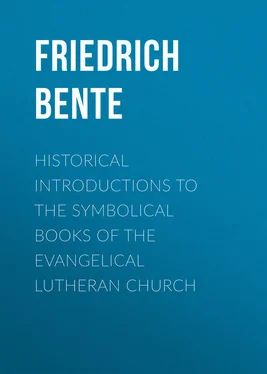Friedrich Bente - Historical Introductions to the Symbolical Books of the Evangelical Lutheran Church
Здесь есть возможность читать онлайн «Friedrich Bente - Historical Introductions to the Symbolical Books of the Evangelical Lutheran Church» — ознакомительный отрывок электронной книги совершенно бесплатно, а после прочтения отрывка купить полную версию. В некоторых случаях можно слушать аудио, скачать через торрент в формате fb2 и присутствует краткое содержание. ISBN: , Жанр: foreign_antique, foreign_prose, на английском языке. Описание произведения, (предисловие) а так же отзывы посетителей доступны на портале библиотеки ЛибКат.
- Название:Historical Introductions to the Symbolical Books of the Evangelical Lutheran Church
- Автор:
- Жанр:
- Год:неизвестен
- ISBN:http://www.gutenberg.org/ebooks/26909
- Рейтинг книги:3 / 5. Голосов: 1
-
Избранное:Добавить в избранное
- Отзывы:
-
Ваша оценка:
- 60
- 1
- 2
- 3
- 4
- 5
Historical Introductions to the Symbolical Books of the Evangelical Lutheran Church: краткое содержание, описание и аннотация
Предлагаем к чтению аннотацию, описание, краткое содержание или предисловие (зависит от того, что написал сам автор книги «Historical Introductions to the Symbolical Books of the Evangelical Lutheran Church»). Если вы не нашли необходимую информацию о книге — напишите в комментариях, мы постараемся отыскать её.
Historical Introductions to the Symbolical Books of the Evangelical Lutheran Church — читать онлайн ознакомительный отрывок
Ниже представлен текст книги, разбитый по страницам. Система сохранения места последней прочитанной страницы, позволяет с удобством читать онлайн бесплатно книгу «Historical Introductions to the Symbolical Books of the Evangelical Lutheran Church», без необходимости каждый раз заново искать на чём Вы остановились. Поставьте закладку, и сможете в любой момент перейти на страницу, на которой закончили чтение.
Интервал:
Закладка:
72. Articles Not Discussed in Meeting of League
As the Southern Germans regarded Luther's formulation of the article on the Lord's Supper with disfavor, the Landgrave found little difficulty in winning over (through Jacob Sturm) the delegates of Augsburg and Ulm to Melanchthon's view of declaring adherence only to the Confession and the Wittenberg Concord. Already on February 11 the cities decided to "decline on the best grounds" the Saxon proposition. Following were the reasons advanced: It was not necessary at present to enter upon the proposition, since the council would make slow progress, as the Emperor and the King of France were not yet at peace. They had not understood this (the adoption of the Saxon proposition) to be the purpose of the invitation to bring scholars with them. They had a confession, the Augustana, presented to the Emperor. It was also to be feared that deliberations on the question whether any concessions should be made, might lead to a division; nor would this remain concealed from the Papists. If the Elector desired to present some articles, he might transmit them, and they, in turn, would send them to their superiors for inspection. (Kolde, Analecta, 296.)
In the afternoon of February 11 the princes according to the report of the Strassburgers, expressed their satisfaction with the resolution of the cities. At the same time they declared that they were not minded to make any concessions to the Papists, nor to dispute about, or question, anything in the Confession or the Wittenberg Concord, "but merely to review the Confession, not to change anything against its contents and substance, nor that of the Concord, but solely to enlarge on the Papacy, which before this, at the Diet, had been omitted in order to please His Imperial Majesty and for other reasons;" that such was the purpose of the deliberation for which the scholars had been summoned; and that this was not superfluous, since "they were all mortal, and it was necessary that their posterity be thoroughly informed as to what their doctrine had been, lest others who would succeed to their places accept something else." The report continues: "The cities did not object to this." (296.) According to this report, then, Luther's articles were neither discussed nor adopted at the official meeting of the princes and estates belonging to the Smalcald League. Without mentioning them, they declared in their final resolution: Our scholars have "unanimously agreed among themselves in all points and articles contained in our Confession and Apology, presented at the Diet of Augsburg, excepting only that they have expanded and drawn up more clearly than there contained one article, concerning the Primacy of the Pope of Rome." (Koellner, 468.) Koestlin remarks: "Since the princes decided to decline the council absolutely, they had no occasion to discuss Luther's articles." (2, 403.)
73. Meeting of Theologians
At Smalcald the first duty imposed upon the scholars and theologians was once more to discuss the Augustana and the Apology carefully, and to acknowledge both as their own confessions by their signatures. Thereupon they were, in a special treatise, to enlarge on the Papacy. The Strassburg delegates report: "It has also come to pass that the scholars received orders once more to read the articles of the Confession and to enlarge somewhat on the Papacy, which they did." (Kolde, Analecta, 298.) However, since neither the Augustana nor its Apology contained an article against the Papacy, the demand of the princes could only be satisfied by a special treatise, the "Tractatus de Potestate et Primatu Papae," which Melanchthon wrote and completed by February 17, whereupon it was immediately delivered to the princes.
The princes had furthermore ordered the theologians, while reviewing and discussing the Augustana (and its Apology), to reenforce its doctrine with additional proofs. Owing to lack of time and books, this was not carried out. February 17 Osiander reports to the Nuernberg preachers: "We are enjoying good health here, although we traveled in stormy weather and over roads that offered many difficulties, and are living under a constantly beclouded sky, which unpleasantries are increased by troublesome and difficult questions in complicated matters… The first business imposed on us by the princes embraces two things: first, to fortify the Confession and the Apology with every kind of argument from the Holy Scriptures, the fathers, councils, and the decrees of the Popes; thereupon, diligently to discuss in detail everything concerning the Primacy, which was omitted in the Confession because it was odious. The latter we completed so far to-day that we shall immediately deliver a copy to the princes. The former, however will be postponed to another time and place, since it requires a longer time, as well as libraries, which are lacking here." ( C. R. 3, 267.)
The discussion of the Confession was also to serve the purpose of obtaining mutual assurance whether they were all really agreed in doctrine. This led to deliberations on the doctrine of the Lord's Supper as well as on the question what concessions might be made to the Romanists. According to a report of Melanchthon, March 1, the theologians were to discuss the doctrines, not superficially, but very thoroughly, in order that all disagreement might be removed, and a harmonious and complete system of doctrines exist in our churches. They were to review the Confession in order to learn whether any one deviated in any article or disapproved of anything. But Melanchthon remarks that this object was not reached, since the special request had been voiced not to increase the disagreement by any quarrel and thus to endanger the Smalcald League. ( C. R. 3, 292.) In a second letter of the same date he says that a real doctrinal discussion had never come to pass, partly because Luther's illness prevented him from taking part in the meetings, partly because the timidity of certain men [the Landgrave and others] had prevented an exact disputation lest any discord might arise. (296.) March 3 he wrote to Jonas in a similar vein saying that the reports of violent controversies among the theologians at Smalcald were false. For although they had been in consultation with one another for the purpose of discovering whether all the theologians in attendance there agreed in doctrine the matter had been treated briefly and incidentally. (298.)
As far as the Lord's Supper is concerned Melanchthon's report concerning the superficial character of the doctrinal discussions is little if at all exaggerated. He himself was one of those timid souls of whom he spoke having from the beginning done all he could not only to bar Luther's articles from the deliberations but also to prevent any penetrating discussion of the Lord's Supper. Assent to the Wittenberg Concord was considered satisfactory although all felt, and believed to know, that some of the Southern Germans did not agree with the loyal Lutherans in this matter. Of the attending theologians who were under suspicion Bucer, Blaurer, Fagius, Wolfart, Fontanus, and Melander, only the first two took part in the deliberations. (292.) March 1 Melanchthon wrote to Camerarius: "Bucer spoke openly and clearly of the Mystery [the Lord's Supper] affirming the presence of Christ. He satisfied all of our party also those who are more severe. Blaurer, however, employed such general expressions as, that Christ was present. Afterward he added several more ambiguous expressions. Osiander pressed him somewhat hotly; but since we did not desire to arouse any very vehement quarrel, I terminated the discussion. Thus we separated, so that agreement was restored among all others, while he [Blaurer] did not seem to contradict. I know that this is weak but nothing else could be done at this time, especially since Luther was absent, being tortured by very severe gravel pains." (292.)
Читать дальшеИнтервал:
Закладка:
Похожие книги на «Historical Introductions to the Symbolical Books of the Evangelical Lutheran Church»
Представляем Вашему вниманию похожие книги на «Historical Introductions to the Symbolical Books of the Evangelical Lutheran Church» списком для выбора. Мы отобрали схожую по названию и смыслу литературу в надежде предоставить читателям больше вариантов отыскать новые, интересные, ещё непрочитанные произведения.
Обсуждение, отзывы о книге «Historical Introductions to the Symbolical Books of the Evangelical Lutheran Church» и просто собственные мнения читателей. Оставьте ваши комментарии, напишите, что Вы думаете о произведении, его смысле или главных героях. Укажите что конкретно понравилось, а что нет, и почему Вы так считаете.












